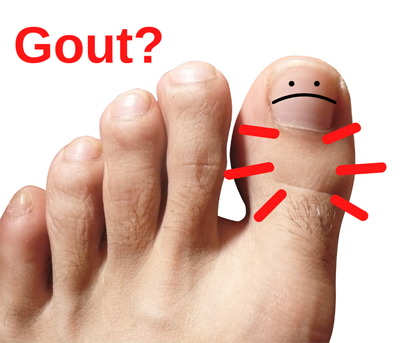Could it be gout?
February 25, 2022
Gout is a common form of inflammatory arthritis. It's characterized by sudden, severe attacks of pain, swelling, redness, and tenderness in one or more joints, most often in the big toe. Other joints that are commonly affected are the lesser toe joints, the ankle, and the knee.
The pain and inflammation that come with gout are the results of uric acid build-up in the blood. Normally, uric acid dissolves into the blood and passes through the kidneys into the urine. Sometimes either the body produces too much uric acid, or the kidneys excrete too little uric acid. When this happens, uric acid can build up, forming sharp, needlelike urate crystals in a joint or surrounding tissue that cause pain, inflammation, and swelling.
There are times when symptoms get worse, known as flares, and times when there are no symptoms, known as remission. These times in-between can be weeks, months, or even years. There is no cure for gout, but it can effectively be treated and managed with medication and self-management strategies.
According to the National Kidney Foundation, the rate of gout in the United States has more than doubled since the 1960s. Approximately 8.3 million Americans have gout, with 75% of those affected being men. Although more common in men, women are increasingly susceptible to gout after menopause. The risk of getting the condition increases with age and is more likely if one or both of your parents had the condition.
Other risk factors for gout include:
- Being obese.
- Using certain medications, such as diuretics (water pills).
- Drinking alcohol. The risk of gout is greater as alcohol intake goes up.
- Eating or drinking food and drinks high in fructose (a type of sugar).
- Having a diet high in purines, which the body breaks down into uric acid. Purine-rich foods include red meat, organ meat, and some kinds of seafood, such as anchovies, sardines, mussels, scallops, trout, and tuna.
If you think you have gout, see your medical provider, even if the pain has subsided. Untreated gout can lead to worsening pain and joint damage. Gout can also lead to kidney stones, and in severe cases, blockage of the tubules that filter the kidneys, leading to kidney failure.
